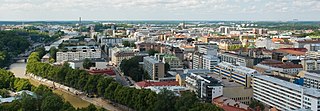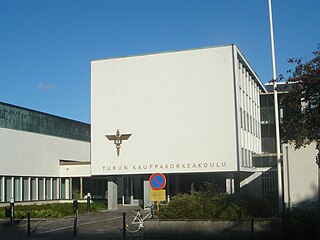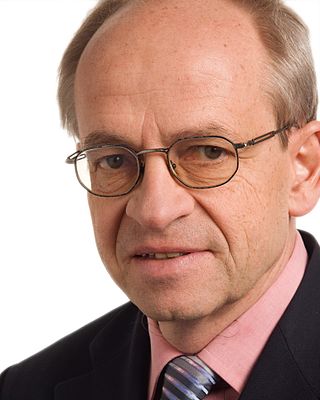
The economy of Estonia is rated advanced by the World Bank, i.e. with high quality of life and advanced infrastructure relative to less industrialized nations. Estonia is a member of the European Union and eurozone. The economy is heavily influenced by developments in the Finnish and Swedish economies.

Finland, officially the Republic of Finland, is a Nordic country in Northern Europe. It borders Sweden to the northwest, Norway to the north, and Russia to the east, with the Gulf of Bothnia to the west and the Gulf of Finland to the south, opposite Estonia. Finland covers an area of 338,145 square kilometres (130,559 sq mi) and has a population of 5.6 million. Helsinki is the capital and largest city. The vast majority of the population are ethnic Finns. The official languages are Finnish and Swedish, of which 84.9 percent and 5.1 percent of the population speak the first as their mother tongue. Finland's climate varies from humid continental in the south to boreal in the north. The land cover is predominantly boreal forest biome, with more than 180,000 recorded lakes.

The economy of Latvia is an open economy in Europe and is part of the European Single Market. Latvia is a member of the World Trade Organization (WTO) since 1999, a member of the European Union since 2004, a member of the Eurozone since 2014 and a member of the OECD since 2016. Latvia is ranked the 14th in the world by the Ease of Doing Business Index prepared by the World Bank Group. According to the Human Development Report 2011, Latvia belongs to the group of very high human development countries. Due to its geographical location, transit services are highly developed, along with timber and wood processing, agriculture and food products, and manufacturing of machinery and electronic devices.

Turku is a city in Finland and the regional capital of Southwest Finland. It is located on the southwestern coast of the country at the mouth of the River Aura. The population of Turku is approximately 202,000, while the metropolitan area has a population of approximately 311,000. It is the 6th most populous municipality in Finland, and the third most populous urban area in the country after Helsinki and Tampere.

The Baltic states or the Baltic countries is a geopolitical term encompassing Estonia, Latvia, and Lithuania. All three countries are members of NATO, the European Union, the Eurozone, and the OECD. The three sovereign states on the eastern coast of the Baltic Sea are sometimes referred to as the "Baltic nations", less often and in historical circumstances also as the "Baltic republics", the "Baltic lands", or simply the Baltics.

The University of Turku is a multidisciplinary public university with eight faculties located in the city of Turku in southwestern Finland. The university also has campuses in Rauma and Pori and research stations in Kevo and Själö.

The economy of Europe comprises about 748 million people in 50 countries.

The Northern Dimension (ND) is a joint policy between four equal partners – the European Union, Russia, Norway and Iceland – regarding the cross-border and external policies geographically covering Northwest Russia, the Baltic Sea and the Arctic regions, including the Barents Region. The ND Policy was initiated in 1999 and renewed in 2006. The Northern Dimension addresses the specific challenges and opportunities arising in those regions and aims to strengthen dialogue and cooperation between the EU and its member states, the northern countries associated with the EU under the European Economic Area and Russia. A particular emphasis is placed on subsidiarity, and on ensuring the active participation of all stakeholders in the North, including regional organizations, local and regional authorities, the academic and business communities, and civil society.

Turku School of Economics is a unit of the University of Turku located in Turku, Finland. It was established as an independent higher education business school in 1950, until it was acquired by the state in 1977. It was the second largest school of its kind in Finland, with approximately 2,000 graduate and 250 postgraduate students and a staff of 350. In January 2010, Turku School of Economics became the seventh faculty of the University of Turku. Its former rector, Professor Tapio Reponen, is now a vice rector of the University of Turku.

Business Finland is a public organization under the Finnish Ministry of Employment and the Economy. It was established on 1 January 2018, with the goal of attracting trade, tourism, and foreign investment, and providing funds for innovation to Finland. And as such, Business Finland is also involved in funding Finnish space researches, under the New Space Economy program, as well as startup companies, under Young Innovative Company funding program among other projects. The organization is made up of two entities: Innovation Business Finland and Business Finland Oy.

VTT Technical Research Centre of Finland Ltd is a state-owned and controlled non-profit limited liability company. VTT is the largest research and technology company and research centre conducting applied research in Finland. It provides research and innovation services and information for domestic and international customers and partners, both in private and public sectors.
The Yantar Special Economic Zone is a Special Economic Zone in Russia that was established in 1996 in the Kaliningrad Oblast of the Russian Federation.

Keijo Aarre Virtanen, is a Finnish historian, PhD 1980. In 1970 Virtanen was affiliated with the University of Turku, where he became professor 1990 in cultural history. He served as the Rector of the University of Turku in 1997–2012.

The Aleksanteri Institute is the Finnish Centre for Russian, Eastern European and Eurasian Studies in the Faculty of Arts of the University of Helsinki. It functions as a national centre of research, study and expertise pertaining to Russia, Eastern Europe and Eurasia, particularly in the social sciences and humanities. The Institute actively promotes cooperation and interaction between the academic world, public administration, business life and civil society, both in Finland and abroad.

Elisa Aaltola is a Finnish philosopher, specialised in animal philosophy, moral psychology and environmental philosophy.

Richard E. Baldwin is a professor of international economics at the IMD Business School. He is Editor-in-Chief of VoxEU, which he founded in June 2007, and was President of the Centre for Economic Policy Research (CEPR) from 2014 to 2018. He is a research associate at the National Bureau of Economic Research and was twice elected as a Member of the Council of the European Economic Association. Baldwin has been called "one of the most important thinkers in this era of global disruption".

Karl Aiginger is an Austrian economist. He was the head of the Austrian Institute of Economic Research (WIFO) between 2005 and 2016, he is a professor at the Vienna University of Economics and Business and an honorary professor at the Johannes Kepler University Linz. He was succeeded by Christoph Badelt as the head of WIFO in September 2016. He established and manages the lateral thinking platform Policy Crossover Center, an interdisciplinary discussion forum on European policy. As an author, he is widely held in libraries worldwide.

The Baltic Sea Parliamentary Conference (BSPC) was established in 1991 as a forum for political dialogue between parliamentarians from the Baltic Sea Region. BSPC aims at raising awareness and opinion on issues of current political interest and relevance for the Baltic Sea Region. It promotes and drives various initiatives and efforts to support a sustainable environmental, social and economic development of the Baltic Sea Region. It strives at enhancing the visibility of the Baltic Sea Region and its issues in a wider European context.
The Warsaw Institute is a Polish nonprofit think tank specializing in geopolitics and international affairs. Founded in 2014, the institute's primary goal is to strengthen the relationship between the United States and Poland. Topics of interest include national security, energy, history, culture, as well as other issues which are seen as being of strategic importance to Poland along with Central and Eastern Europe.
Kari Tapani Liuhto is a professor of international business and the Director of the Pan-European Institute and the Centrum Balticum Foundation. Liuhto is also the editor-in-chief of the English-language review called as Baltic Rim Economies and of the Finnish-language Pulloposti column series.
















